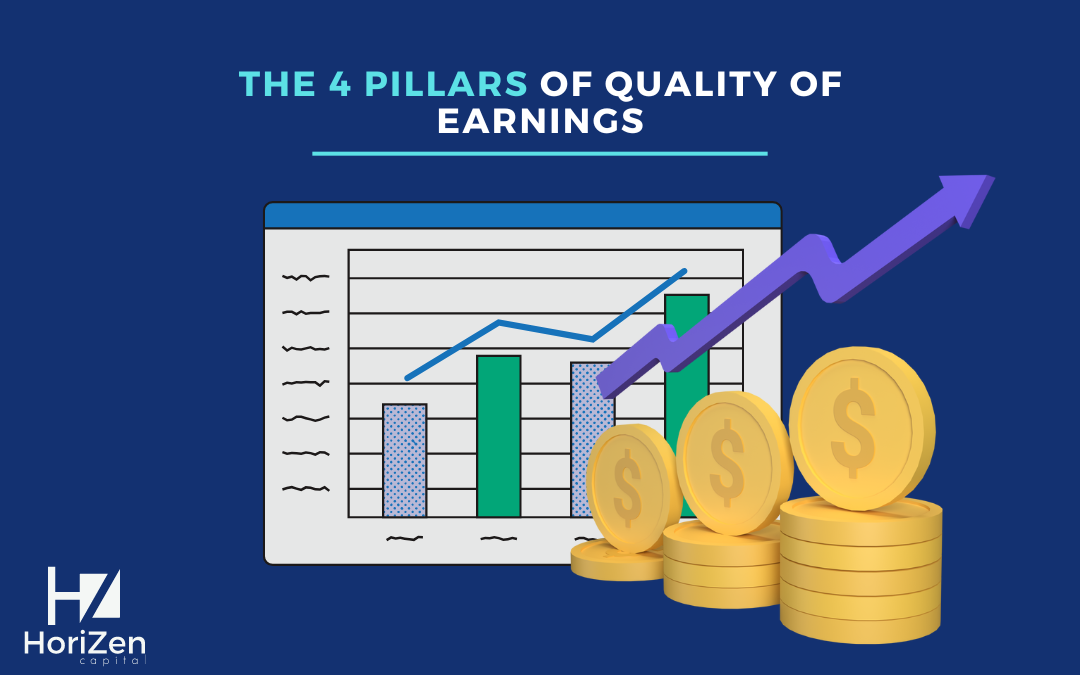
PPC For SaaS – Top Experts Reveal Advice to Scale: Dylan Hey & Luis Camacho
09/30/2022
What Quality of Earnings says on Financial Performance
The QofE analysis aims at giving an accurate representation of the financial performance of a company by adjusting its reported EBITDA (or the most relevant profitability measure of its earnings report) to present the best reflection of the performance of the company on an ongoing, normalized basis.
Quality of earnings is directly intertwined with advanced financial statement analysis and holds a central place in any professionally run M&A process.The quality of earnings analysis is the centerpiece of a financial due diligence report and can have a significant impact on normalized cash flow statement, net working capital, net debt and net income.

Let’s review why quality of earnings is important, review a few concrete exemples of QofE adjustments and understands why it is important to use a qualified Transaction Services advisor rather than your everyday accountant or auditors.
The 5 Main Goals of a Quality of Earnings and the Importance of Normalized Cash Flow

In a financial due diligence process the baseline is that you cannot only rely on reported financial statements, even when they’re audited. The audited financials statements (P&L, balance sheet and cash flows) are only the starting point of a quality of earnings process. Here are the 5 main reasons why quality of earnings analysis is performed.
1) Uncover Red Flags, Earnings Manipulation and Gives Reassurance the Buyer
Financial statements are usually audited. However an accounting audit only makes sure that accounts have been prepared in accordance with recognized accounting standards but there are ways for a seller to manipulate reported net income within these legal accounting frameworks.
Also, an audit generally uses “materiality threshold”. It means that if an amount is lower than the threshold, auditors won’t spend time checking its accuracy.
Keep in mind that in the context of M&A process a company can be valued based on a multiple of EBITDA that can range from 3x to 20x and above. That means that a $100k extra revenue below the materiality threshold for an audit may translate into a $2m extra in final purchase price.
A serious financial due diligence consultant will dig further into how accounts have been prepared and not stop at the same materiality threshold as auditors.
By spending extra time interviewing top management, finance staff and spotting unusual trends in specific accounts like provision accounts, Transaction Services advisors go beyond pure financial accounting and help flag unorthodox practices and improve the confidence of potential buyer.
2) Give an Accurate Representation of the Quality of Earnings
Because the representation seeked by accounting standards is different than what is deemed an accurate representation of a business in the context of a M&A deal, having a professional Financial Due Diligence expert perform a quality of earnings will help define an adjusted EBITDA more fit for the purpose of a Transaction.
For instance, accounting standard may allow to recognize certain expenses or defer them for tax purposes. While this is totally legal, the vision from a buyer’s perspective may differ from the vision offered by Accounting.
Another example relates to the cut-off, which is the decision to recognize part of the revenue of a multi-month or multi-year contract over current year and the following year. Financial due diligence analysts challenge the cut-off methodology and may adjust each year EBITDA to give a better reflection of the profitability of the target company across the years.
3) Give a Better Understanding of the Business to the Buyer
The quality of earnings is part of the full analysis of financial statements. While the numbers are important, the comments and explanation of the context also provide valuable information to buyers.
For instance, if for a SaaS (software as a service business) it appears that the company lost a few days of revenue last year due to a technical malfunction or a default of service from a provider, while the EBITDA adjustment in itself is important for the buyer, understanding that there may be a fragility on the technical or supplier side is also important information.
If the business went through important changes over the past few years, like discontinuing an historical line of products, or acquiring and merging a smaller competitor, reported EBITDA would only poorly reflect these business events. The quality of earnings analysis however would best reflect the historical performance of the business on a pro forma basis to help buyer understand the target on an ongoing basis.
4) Use Financial Statement Analysis to Provide a Reliable Basis for Forecast and Valuation
Budgeting and forecasting are two important processes in Financial Planning to run a business, but they’re even more important in the context of a M&A Transaction or investment.
The value of a company is directly tied to its future performance. The perfect way to understand is to think of an oil well. If you were buying an oil well, would you be more interested in how much oil was extracted last year, or would you rather want to know how much oil can still be extracted and how fast?
While the situation is slightly different with businesses who do not rely on limited natural resources, the logic of looking forward rather than at past income statement to assess how much to pay for the target company is similar.
Since a lot of forecast models take the latest actual years as a basis to calculate future expected growth, providing reliable EBITDA and cash flow numbers through the analysis of earnings quality and of how normative current cash flow are provides a great help to increase forecast accuracy.
Also, since a widely used valuation methodology relies on looking at a multiple of EBITDA, adjusting the reported EBITDA can have a significant impact on valuation and price paid by buyer.
5) Used by Banks for Estimation Level of Financing
Banks look at different types of ratios in determining whether they’d like to finance a deal and for what amount.
It is important for them to understand the level of debt payment the target can easily service which is why they like having a normalized earnings report prepared by independent experts along with a view on normalized net working capital and a review of balance sheet to assess their level of risk.
A Few Examples of Quality of Earnings Adjustments on Reported Earnings

A financial due diligence engagement includes an exhaustive review of all the financial statements, including P&L (revenue, profitability, seasonality, cost structure…) and balance sheet (quality of assets, capex requirement, net working capital analysis…) but the quality of earnings analysis and the normalized earnings report are the most sought after pieces.
Here are some examples of the most common quality of earnings adjustments we encounter.
a) Reversal of Management’s Adjustments
It’s common that Management present their own view of EBITDA normalization. One of the first steps is to review, understand and challenge these adjustments and reverse or correct the ones that do not seem justified.
3 classic exemples of management adjustments that need to be reversed or amended include:
- Adding back 100% of owner’s salary even though owner has an active role in managing the business which will need to be taken over by someone else post-transaction.
- Adjusting EBITDA to reflect a full year cost saving for a service provider that was switched for a cheaper one last month. The main argument to not accept this adjustment is that there may be a loss of quality in service explaining the lower cost and potential negative impact on the business.
- Add back the costs of the company retreat, arguing that this is a one-off event when it clearly appears that each year includes expenses related to team building and entertainment.
b) Reclassifications
Reclassifications relate to items that are by default included in reported EBITDA but are by nature below EBITDA items.
3 classic exemples of quality of earnings reclassifications
- Interest paid on lease financing or car loan and included above EBITDA as part of the vehicle cost
- Depreciation costs that are included above EBITDA, which happens when the company’s reporting presents P&L by destination (eg. the line car’s cost and maintenance may include depreciation which should by nature be classified below EBITDA)
- Capitalization of expenses purely related to tax incentive schemes offered by the Government
c) Normalization
An income statement or earnings report prepared by an accountant reflects the net income generated over a period of time regardless of whether the period properly reflect the state of the business as of today.
For instance, if a one-in-a-century hurricane damaged the manufacturing plant of the target during the year, the net income would include the costs associated with the event, the loss of revenue and the capex related to repairing the plant. But from a Transaction perspective this has no impact on the performance of the business going forward and the adjusted EBITDA and the purchase price should be cleaned of the impact of this uncommon natural disaster.
A few exemples of normalization
- Owner is CEO and pays themselves way above market salary
- The market price of a key raw material has recently increased drastically
- There was an unusual overstock of merchandises leading to higher stocking costs
d) Proforma / Standalone Adjustments
Proforma and standalone adjustments are slightly different from normalization adjustments as they relate to a change of perimeter over the course of the period, either coming from M&A or launch of a new product or geography. They may be particularly tricky when they relate to a new product launch or to a product being discontinued because you’ll need to decide first whether this is a recurring business occurrence or a singularity.
For instance the Coca Cola company launches and stops products every year, however if they decided to discontinue Coke there would need to be a serious pro-forma adjustment to look at past financial performance as if Coke was never part of the offering.
e) Other Matters Raised During the QofE Process
Other matters are items that can not be accurately quantified but have the potential to have a serious impact on the deal. A few exemples of other matters are:
- An important supplier just got out of business
- Strong inflation
- Risks raised during the Tax due diligence
Why use a QofE Transaction Advisory Professional

The process to analyze earnings during a sale process is extremely important to prevent any bad surprise. Performing proper financial due diligence requires a very specific set of skills and experience, being able to work with the management and the finance team to go beyond the simple financial information, being aware of potential accounting tricks, know how to chase, follow-up and run a proper process.
Financial due diligence is the type of work that you need to have done before to be good at it. Here is why you’ll want your quality of earnings report to be done by a financial due diligence professional.
A Quality of Earnings Report is Not an Accounting Audit
When we say audit, we mean the regulatory, year-end audit that any company of a certain size need to undergo. An audit is there to make sure the company’s accounting is done properly, in accordance with the law.
A quality of earnings report will use the results of the audit and the audited financials as a starting base, but it’s purpose is to give a fair representation of the likely performance of the business going forward, post-transaction. In a sense, an audit is backward-looking while a QofE is forward looking.
Understanding Accounting Principles is Important but not Sufficient
During a due diligence process, understanding accounting principle serves the purpose of understanding where the numbers come from and how they’ve been reported. It is kind of understanding the alphabet, grammar and conjugaison rules. However the purpose of the QofE is to make sentences to write the story of the financial performance of the company.
Requires More Analytical Skills Than a CPA Training Provides
A due diligence, when properly done, is highly analytical. And since every company and industry have their very own specificity and set of analysis to check and understand the trends, it requires the capacity to adapt and think on their feet.
Since we’re often work with detailed raw data to perform the most insightful analyses, a good financial due diligence advisor requires skills in data cleaning, database understanding, advanced excel knowledge and generally a strong mathematics and logic foundation.
Requires a Good Understanding of a Full M&A Process
A quality of earnings process always happen when investors or buyers are involved, as part of an overall buying and selling process. This is important to understand what the key areas are that will be important for your client, the timing of the transaction and how to approach the target and communicate with tem.



